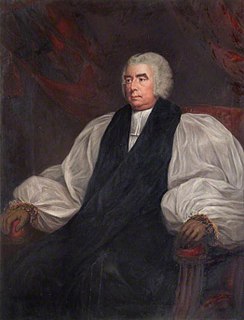Sir Giles Rooke (1743–1808) was an English judge.

Sir Giles Rooke (1743–1808) was an English judge.

The third son of Giles Rooke, a merchant of London and director of the East India Company, by Frances, daughter of Leonard Cropp (1710-1785) of Southampton, he was born on 3 June 1743. He was educated at Harrow School and matriculated at St John's College, Oxford on 26 November 1759, graduating B.A. in 1763. He proceeded M.A. in 1766, and in the same year was elected to a fellowship at Merton College, which he held until 1785. [1]
Rooke was also called to the bar at Lincoln's Inn in 1766, and went the western circuit. In 1781 he was called to the degree of serjeant-at-law, and in April 1793 was made king's serjeant. At the next Exeter assizes he prosecuted to conviction William Winterbotham, a dissenting minister at Plymouth, for preaching sermons of a revolutionary tendency; and on 13 November of the same year was appointed to the puisne judgeship of the Court of Common Pleas, left vacant by the death of John Wilson. At the same time he was knighted. [1] Rooke presided at the trial at the York Lent assizes in 1795 of Henry Redhead Yorke for conspiracy against the government.

He died on 7 March 1808. Rooke left a large family by his wife, Harriet Sophia Burrard (d. 1839), the sister of Admiral Sir Harry Burrard Neale 2nd Bt., of Walhampton. Lady Rooke was the daughter of Colonel William Burrard of Walhampton, Hampshire; Governor of Yarmouth Castle. The Rookes were the grandparents of the author William Henry Giles Kingston.
Rooke was author of Thoughts on the Propriety of fixing Easter Term, 1792 (anon.) [1]
![]() This article incorporates text from a publication now in the public domain : Lee, Sidney, ed. (1897). "Rooke, Giles". Dictionary of National Biography . Vol. 49. London: Smith, Elder & Co.
This article incorporates text from a publication now in the public domain : Lee, Sidney, ed. (1897). "Rooke, Giles". Dictionary of National Biography . Vol. 49. London: Smith, Elder & Co.

General Sir Harry Burrard, 1st Baronet was a British soldier who fought in the American War of Independence, the French Revolutionary Wars and in the Peninsular War.

Sir John Eardley Wilmot PC SL, was an English judge, Chief Justice of the Common Pleas from 1766 to 1771.

Samuel Goodenough was the Bishop of Carlisle from 1808 until his death in 1827, and an amateur botanist and collector. He is honoured in the scientific names of the plant genus Goodenia and the red-capped robin. In addition, William Kirby's 1802 book on the bees of Engand, page 182, mentions, in Latin, that the cuckoo bee Nomada goodeniana is named after Goodenough with the following words:
A viro Reverendo S. Goodenough, LL. D. Canonico Windsoriensi, Botanico summo tum et in Entomologia lynceo, nomen suum haec Apis mutuatur.

Daniel Orme (1766–1837) was an English artist, publisher and official Historical Engraver to George III and the Prince of Wales, the future George IV.

Henry Godolphin (1648–1733) was a Provost of Eton College and Dean of St. Paul's Cathedral in London, a position in which he clashed with Sir Christopher Wren in the period when the new cathedral had reached the finishing touches.

Sir Thomas Parker, PC, KS (1695–1784) was an English barrister and judge, Privy Counsellor and Lord Chief Baron of the Exchequer.

Edward Michael Pakenham, 2nd Baron Longford was an Irish sailor and landowner.
Lieutenant-General Henry George Hart (1808–1878) was a British Army officer who was best known as the author, editor, and proprietor of Hart's Army List, an unofficial publication recording army service.

Sir Richard Perryn (1723–1803) was a Welsh judge who became baron of the exchequer.

Sir Simon Le Blanc was an English judge.
Sir John Savile (1546–1607) was an English lawyer and judge.

Sir Creswell Levinz (1627–1701), judge, was the second son of William Levinz, the elder, of Evenley, Northamptonshire, by Mary, second daughter of Richard Creswell of Purston in the same county. He was the brother of Baptist Levinz and William Levinz, and nephew of the Royalist Robert Levinz.
Richard Wooddeson (1745–1822) was an English jurist, Vinerian Professor of English Law from 1777.
Adam Neale M.D. was a Scottish army physician and author.
Sir George Hutchins was an English lawyer and politician, a Member of Parliament and king's serjeant.
John Puleston (c.1583–1659) was a Welsh barrister and judge.
James Capper (1743–1825) was a British army officer of the East India Company, known as a writer and meteorologist.
Sir William Rough (c.1772–1838) was an English lawyer, judge and poet.
Sir Christopher Puller was an English lawyer who was briefly Chief Justice of Bengal.
General Sir Henry Warde was a British Army officer and colonial governor.